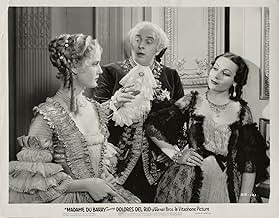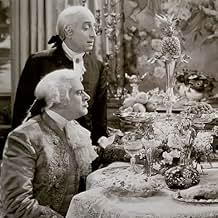I've noticed that this film has been referred to as a "Pre-Code Film", though this is not the case. The strengthened Production Code was enacted as of July, 1934 and this film was not released until October, 1934. So, its plot with heavily implied sex was an apparent attempt to flaunt the code--and as a result, it was condemned by the Catholic Legion of Decency--hurting its box office appeal to most Catholics.
As for my review, something you might want to keep in mind is that I am not a big fan of costume dramas. I find that all too often, the films look nice with all the lovely period dress BUT also tend to be rather sterile and dull--though of course, there are some exceptions. Back in the 1930s, they were rather popular--though in recent decades they've become rather rare--showing that perhaps my taste and the public's in general aren't too far apart here.
This film is about the last mistress of King Louis XV of France. For the most part, she dressed in the finest clothes and had her every whim catered to--which makes me wonder why they'd make such a film. After all, if she was a spoiled and vacuous whore (I'm definitely cutting to the heart of the matter), why is this so interesting as to merit a film? In other words, would the audience of the Depression even care about such a worthless individual? I know I sure didn't.
Sadly, the most interesting things about this infamous lady were her final days--which are not even addressed in the movie. Apparently, the people of the new French Republic also didn't care much for her and her extravagant lifestyle, so they had her beheaded. Considering how she lived while people starved, I say good riddance! And, with my attitude, you could assume I was not a big fan of this bloated costume drama or absolute monarchies! As for the film, Delores Del Rio runs around in nice gowns, acts snippy and childish and gets in a cat fight with the future queen, Marie Antoinette. Miss Del Rio's performance is very broad and it's hard to imagine her capturing anyone's heart as she doesn't exactly exude "sex appeal". As my daughter so eloquently pointed out "she's so flat!"---um, yes, I suppose that, too, is true but more importantly, she looked nothing like the surviving portraits of this trollop.
As for the king, Louis XV, the movie seemed to portray him rather accurately. Reginald Owen was about the right age, puffy and a bit of an incompetent given to his vices...in other words, he WAS Louis. His snippy ways with his ministers and too much attention to his affairs did characterize the latter years of his reign.
As for Marie Antoinette, I doubt if she continually screamed "I am Marie Antoinette of Austria!"--I THINK everyone around her already was well aware of this! She, like her husband (Louis XVI) and Madame Du Barry, seemed more like caricatures--one-dimensional and dull. I am sure these people had personalities--for good and for bad and were not much like the film portrays them.
Overall, the film looked good but didn't have much sense of time perspective. Apparently, Du Barry and the King were "best friends" for some time--though in this film, it looks like they'd only been lovers for a few days, weeks or perhaps months. Too sketchy to be of interest to history teachers like myself and probably too dull to anyone else.
By the way, in the final scene between Du Barry and Louis XV, the choice of music was odd. Why did they choose Beethoven...a German composer? Plus, this piece ("Pathetique") wasn't even written until well after Louis became worm chow.





































